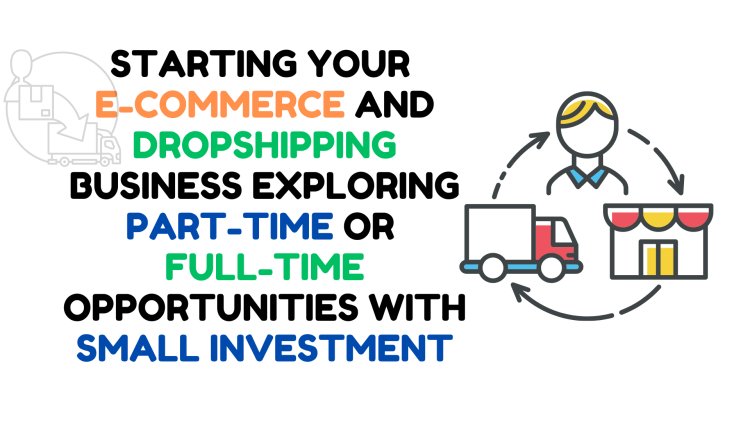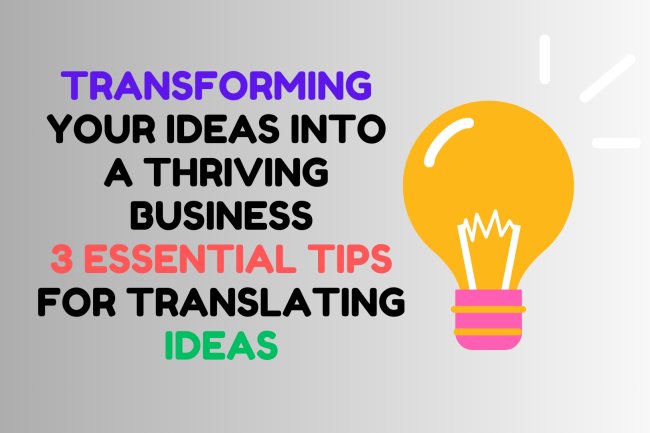E-commerce and Dropshipping Business part time with Small Investment
Discover the potential of starting your own online business and explore the flexibility it offers. With this guide, learn how to navigate the world of e-commerce and dropshipping, leveraging small investments for maximum returns.

Introduction:
In today's digital landscape, the growth of e-commerce and the convenience of online shopping have created exciting opportunities for aspiring entrepreneurs. With the rise of user-friendly platforms (Shopify, Amazon, eBay etc) and the option of dropshipping, starting an e-commerce business has become more accessible than ever. This article will delve into the world of e-commerce and dropshipping, highlighting the benefits, strategies for success, and the importance of effective marketing and customer service.
The Power of E-commerce: E-commerce has revolutionized the way people buy and sell products. Setting up an online store allows you to tap into a global marketplace and reach customers around the world. With the right strategies and tools, you can turn your passion or expertise into a profitable online business.
- Choosing Your E-commerce Model: When starting an e-commerce business, you have two primary options: creating and selling your own products or adopting the dropshipping model.
a. Creating and Selling Your Own Products: This model involves manufacturing or sourcing products, establishing your brand, and managing inventory. It offers greater control over product quality, branding, and profit margins. However, it requires upfront investment, inventory management, and fulfillment logistics.
b. Dropshipping: Dropshipping is an attractive option for those who prefer a low-risk approach. With dropshipping, you partner with suppliers who handle inventory storage and shipping. As a result, you don't need to invest in inventory upfront, and the supplier ships products directly to your customers. Dropshipping allows you to focus on marketing and customer service rather than product sourcing and fulfillment.
-
Selecting the Right E-commerce Platform: To launch your e-commerce store, you'll need a reliable platform that offers essential features, security, and scalability. Popular platforms like Shopify, Etsy, and WooCommerce provide user-friendly interfaces, customizable templates, secure payment gateways, and robust inventory management systems. Evaluate each platform's features, pricing, and compatibility with your business model to make an informed choice.
-
Product Selection: Selecting the right products is crucial for the success of your e-commerce business. Conduct market research to identify profitable niches, trending products, and customer demands. Consider factors such as product quality, uniqueness, target audience, and profit margins. Look for opportunities to differentiate yourself from competitors and provide value to your customers.
-
Effective Marketing: Marketing is the key to driving traffic and sales to your e-commerce store. Develop a comprehensive marketing strategy that includes:
a. Search Engine Optimization (SEO): Optimize your website with relevant keywords, meta tags, and compelling product descriptions to improve search engine rankings.
b. Social Media Marketing: Utilize social media platforms like Facebook, Instagram, and Pinterest to showcase your products, engage with your audience, and build brand awareness.
c. Influencer Partnerships: Collaborate with influencers and bloggers in your niche to reach their dedicated audiences and generate product recommendations and reviews.
d. Content Marketing: Create valuable and engaging content such as blog posts, videos, or podcasts to establish yourself as an authority in your industry and attract organic traffic to your website.
e. Paid Advertising: Consider using platforms like Google Ads, Facebook Ads, or Instagram Ads to reach a broader audience and drive targeted traffic to your store.
- Exceptional Customer Service: Providing outstanding customer service is vital for building trust and loyalty. Promptly respond to customer inquiries, address concerns, and resolve any issues that may arise. Offer multiple channels for customer support, such as email, live chat, or phone, to cater to different preferences. Building strong relationships with your customers will lead to positive reviews, repeat purchases, and referrals.
Conclusion:
E-commerce and dropshipping have opened doors to entrepreneurial success in the online marketplace. By selecting the right business model, leveraging the power of effective marketing, and delivering exceptional customer service, you can create a thriving e-commerce business. Whether you choose to create and sell your own products or opt for the dropshipping model, success lies in careful product selection, targeted marketing strategies, and a dedication to providing an exceptional customer experience. Embrace the potential of e-commerce, explore your passions, and embark on your journey to online entrepreneurship.
| Section | Description |
|---|---|
| Introduction | Introduces the growth of e-commerce and dropshipping as exciting opportunities for entrepreneurs. |
| The Power of E-commerce | Discusses how e-commerce has revolutionized buying and selling, offering a global marketplace. |
| Choosing Your E-commerce Model | Explores the two primary e-commerce models: creating/selling your own products and dropshipping. |
| Selecting the Right E-commerce Platform | Highlights the importance of a reliable platform and evaluates popular options like Shopify, Etsy, and WooCommerce. |
| Product Selection | Discusses the significance of product selection, market research, and differentiation from competitors. |
| Effective Marketing | Covers key marketing strategies including SEO, social media marketing, influencer partnerships, content marketing, and paid advertising. |
| Exceptional Customer Service | Emphasizes the importance of outstanding customer service for building trust and loyalty. |
| Conclusion | Concludes by highlighting the potential of e-commerce and dropshipping, emphasizing product selection, marketing, and customer service. |
FAQ: Frequently Asked Questions
1. What is e-commerce and why is it important for entrepreneurs? E-commerce refers to buying and selling products online. It's important for entrepreneurs because it provides access to a global marketplace and the opportunity to turn passions or expertise into a profitable online business.
2. What are the two main e-commerce models for entrepreneurs? The two main e-commerce models are creating/selling your own products and dropshipping. The former involves manufacturing or sourcing products, while the latter involves partnering with suppliers for inventory and shipping.
3. How do I choose the right e-commerce platform for my business? Select a reliable platform like Shopify, Etsy, or WooCommerce based on features, pricing, security, and compatibility with your business model.
4. How important is product selection in e-commerce? Product selection is crucial for success. Conduct market research to identify profitable niches, trending products, and customer demands. Look for ways to differentiate yourself and provide value.
5. What are some effective marketing strategies for e-commerce businesses? Effective marketing strategies include SEO, social media marketing, influencer partnerships, content marketing, and paid advertising. These strategies drive traffic and sales to your online store.
6. Why is exceptional customer service important in e-commerce? Exceptional customer service builds trust and loyalty. Respond promptly to inquiries, address concerns, and offer multiple support channels. Positive customer experiences lead to repeat purchases and referrals.
7. How can entrepreneurs succeed in e-commerce and dropshipping? Entrepreneurs can succeed by selecting the right model, focusing on product selection, implementing effective marketing strategies, and providing exceptional customer service. These elements contribute to building a thriving e-commerce business in the online marketplace.
What's Your Reaction?




















